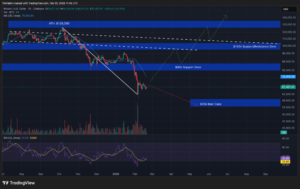Last updated:
 Why Trust Cryptonews
Why Trust Cryptonews
Ad Disclosure
We believe in full transparency with our readers. Some of our content includes affiliate links, and we may earn a commission through these partnerships. Read more

Donald Trump announced new tariffs on imports from Canada, Mexico and China over the weekend, prompting crypto investors to cut risk.
Consequently, Ether—the world’s second-largest digital asset—plunged by as much as 26.53% to $2,135 on Monday. Notably, this marked its steepest loss in nearly four years and its largest intraday percentage drop since May 2021.
Trump escalated international tensions by signing an executive order that imposes new tariffs on these countries. This measure, long threatened by Trump, signals a pivotal shift. It has sparked a fierce international dispute, with each country pledging further counteractions.
Trade War Fears Spark Widespread Crypto Sell-Off
In response, Bitcoin prices plunged sharply, hitting a low of $92,460 and slipping below $100,000 for the first time since early January. This decline formed part of a broader market sell-off, as investors shifted toward safer assets amid fears of inflation and economic turbulence triggered by the trade war.
Additionally, other cryptocurrencies also dropped: XRP lost 23% of its value, Solana decreased by 7.5% and Dogecoin fell by 24.5%. In response to Trump’s tariffs, crypto traders actively reduced their positions across various tokens.
Following the tariff announcement, over $2b in Bitcoin liquidations took place immediately, according to CoinGlass data. These liquidations encompassed both long and short positions. However, a staggering $1.83 billion came from long liquidations, revealing that bullish traders were unexpectedly impacted by the market’s swift downturn.
Global Trade Woes Lower Demand for Bitcoin and Other Cryptos
Tariffs hamper global trade and slow down economic growth, which reduces disposable income and consumer spending. As a result, investors often have less capital available to put into cryptocurrencies. Additionally, some trade policies can boost the strength of the US dollar, driving up the cost of Bitcoin and other dollar-priced assets for international buyers, and consequently, lowering demand.
Moreover, cryptocurrencies have become more closely linked to traditional financial markets. Therefore, when trade tensions cause stocks to fluctuate or decline, crypto prices typically fall as well, mirroring a broader change in investor sentiment.
Analysts Debate Long-Term Gains Versus Short-Term Turbulence
Analysts remain divided over the long-term consequences. Some predict that the tariffs could weaken the dollar and lower US rates, potentially benefiting Bitcoin over time. Conversely, others warn that the trade war might spark immediate inflationary pressures and market corrections.
10X Research’s Markus Thielen noted that although Bitcoin nearly broke out on Friday, Trump’s signing and implementation of the initial round of tariffs triggered a market pullback.
Moreover, Thielen explained that despite the market largely pricing in Trump’s tariffs on Feb. 1, their enactment still derailed the Bitcoin rally and threatened key technical support levels.
Further, while investors were aware of the tariffs, they had focused primarily on the DeepSeek saga, underestimating the geopolitical backlash and the threat of retaliatory measures from foreign leaders.

















